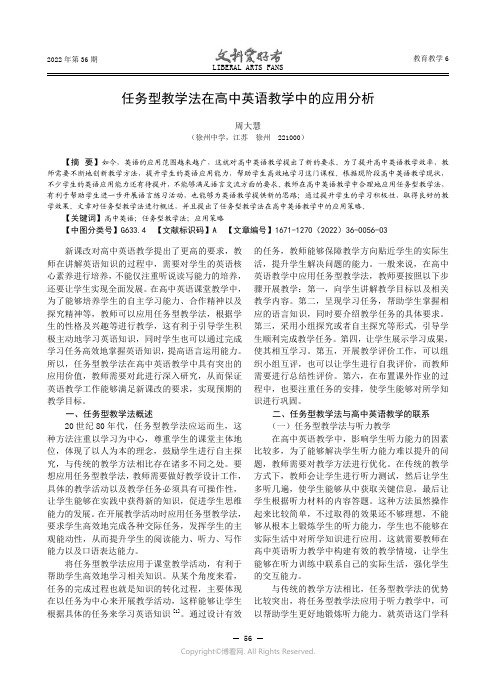英语专业毕业论文-高中英语语法的任务型教学研究
关于任务型教学法在高中英语教学中运用的调查与研究

关于任务型教学法在高中英语教学中运用的调查与研究【摘要】任务型教学法是近年来我国英语教学广为提倡和运用的一种教学方法,它是以学生为中心,以具体的任务为学习动力或动机,在完成任务的过程中学习语言,本文以调查问卷,访谈的方式调查了此教学法在高中英语教学中实施的现状。
分析了存在的问题,并提出对策。
【关键词】高中英语;任务型教学法一、引言多年来,在高中英语教学中,教师多采用传统的英语教学方法,出于应试的目标,教师在课堂上过多的强调对知识的机械掌握,而忽略了英语作为交际工具的功能。
学生学英语的目的只为应付英语考试,而缺乏用英语进行交流沟通的能力。
这些现象严重背离了新课标教学改革的宗旨。
二十世纪八十年代以来,从交际英语教学法发展而来的任务型教学法被渐渐引入到高中英语教学中。
任务型教学法以学生为中心,它要求学生能为要完成的学习任务积极准备,并在学习过程中积极参入和配合课堂交际活动,鼓励学生不害怕在语言交际活动中出错。
同时任务型教学法对教师提出了更高的要求,要求教师付出更多的精力和热情,要求教师合理设计教学任务完成的过程,教师们需要化大量的时间和精力去思考任务的类型、主题、完成任务的环境及完成任务的质量。
教师们在不断的进行任务型英语教学法理论研究和实践探索。
在推行任务型教学法的过程中,师生们体会到了这种方法的优点以及它所带来的成效,同时,也体会到了在推行任务型教学法中的困难和障碍。
二、任务型教学法的相关理论和研究任务型教学法指的是以具体的任务为学习动力或动机,以完成任务的过程为学习过程,以展示任务成果的方式来体现教学成就的一种教学方法,在完成任务的过程中实现对主题的理解。
学生在课堂上以意义为焦点的活动,参与开放型的交际任务。
在完成任务过程中,学生注重语言交际的意义,充分利用自己已经获得语言知识,通过交流获取所需信息,其学习过程是沿着开放的途径达到预期的教学目标。
任务型教学法基于语言习得,语言学,心理学等理论。
其中最主要基于语言习得理论。
任务型教学法在高中英语语法教学中的应用研究

任务型教学法在高中英语语法教学中的应用研究
任务型教学法是一种以任务为导向,学生主动参与的教学方法。
在高中英语语法教学中的应用研究,任务型教学法可以有效地提高学生对语法知识的理解和应用能力,培养学生的语言运用能力和交际能力。
以下是任务型教学法在高中英语语法教学中的具体应用研究。
1. 任务设计:
通过设计与学生生活经验相关的任务,激发学生的学习兴趣和动机。
可以设计一个题为“为你的英语笔友撰写一篇信”的任务,让学生在任务中通过运用所学语法知识,书写一封合乎规范的英语信件。
2. 情境化教学:
在任务型教学中,设置情境,让学生在实际语言环境中运用语法知识。
在讲解“一般过去时”,可以给学生演示一个在超市购物的情境,然后让学生根据所见情景,运用一般过去时的用法描述超市里的场景和自己的购物经历。
3. 合作学习:
任务型教学法强调学生的合作学习和参与,可以让学生分组合作完成任务。
让学生以小组形式讨论并制作一个运用了被动语态的广告海报,通过合作讨论和实际操作,学生可以加深对被动语态的理解和应用。
4. 反馈与交流:
在任务完成后,及时给予学生反馈,让学生知道自己的优点和不足之处。
鼓励学生在小组或全班展示自己的成果,给予其他学生的评价和鼓励。
通过反馈和交流,学生可以从多个角度对自己的语法知识进行检验和提高。
5. 个性化教学:
任务型教学法注重学生个性差异,可以根据学生的兴趣和水平差异,设计不同难度和类型的任务。
对于语法学习较好的学生,可以设计一些较为复杂的任务,让他们挑战自己的能力;而对于语法学习较差的学生,可以设计一些简单明了的任务,让他们逐步提高。
高中英语课中任务型教学应用论文

试论高中英语课中任务型教学的应用1.前言英语任务型教学的模式主要是在20世纪80年代语言习得理论和交际教学思想的影响下产生的关于英语教学的重要语言学理论,它是语言教学的重要途径之一,在任务型语言教学的模式中,最重要的环节是老师对于语言学习任务的设计,任务的设计在整个教学模式中占有重要的位置,可以说它将直接影响到教学所取得的实际效果。
[1]随着我国新课程的改革,这种模式越来越被我国高中的英语教学所重视,它强调教学以学生为主体,把课堂还给学生。
2.高中英语任务教学应用的优点探析与传统的英语教学模式相比,任务型英语教学的模式的优点主要表现在:2.1 注重实践性,让学生在学习中发现规律任务教学的重要任务之一就是要让学生在学习语言的过程中不断的发现语言的规律,不断注意总结,同时在总结中发现问题,注意归纳所学到的英语知识,使得所学到的英语知识能够为生活服务,同时在学习的过程中也不是枯燥的背单词、背语法,而是将英语融入实践中,在实践中掌握所要学习的英语句子、单词和短语。
2.2 真实性,具体性任务的设计是高中英语任务教学的重要环节,而在任务的设计当中,老师会尽可能地让学生参与到每个任务的设计环节当中,使得整个的学习任务接近于生活,同时在设计问题的当中,老师也会尽可能地把生活中真实的语言融入到教学任务中而且一般是学生在生活中常用到的语言。
2.3 更加注重学生对语言的应用能力在传统的应试教育思想的影响下,英语的教学存在着很多的问题,老师的教学以追求升学率为主,学生的学习以考高分为主,完全忽视了英语作为语言的交际功能,所以,很多学生都只有读写的能力,而没有听说的能力,尤其是说的能力,可以说很多的学生学的都是哑巴英语,这样一来,就严重违背了我们学习英语的初衷。
任务型教学的应用则改变了这一做法,它要求老师在教学中以交流为主,让学生在掌握语言形式以及语言规律的基础上,努力提高运用语言的能力。
2.4 以”以学生为本”的思想作为指导(段落左对齐)以学生为本的思想是新课程改革的一大特色,同时也是高中英语任务型教学的一大特色,在教学中,我们更加强调学生的主体性,以学生的情感认知以及学习方法为教学目标,强调学生的形成性评价,将任务型教学模式贯穿的每一个教学环节中,总之,我们更加的强调”以学生为本”。
任务型教学法在高中英语语法教学中的应用研究

任务型教学法在高中英语语法教学中的应用研究1. 本文概述随着21世纪教育改革的不断深入,传统的英语语法教学方法已经无法满足当代学生的需求。
为了提高学生的英语实际应用能力,任务型教学法作为一种新型的教学模式,近年来受到了教育界的广泛关注。
本文旨在探讨任务型教学法在高中英语语法教学中的应用,并分析其对学生学习效果的影响。
通过对当前高中英语语法教学现状的分析,本文指出了传统教学方法的局限性,并提出了任务型教学法作为解决方案。
本研究采用了定性和定量相结合的研究方法,通过课堂观察、问卷调查和访谈等多种手段,收集了实施任务型教学法的高中英语教师和学生的反馈信息。
研究发现,任务型教学法能够有效激发学生的学习兴趣,提高他们的参与度和合作能力,从而促进英语语法知识的掌握和应用。
同时,本文还探讨了在实际教学中如何设计和实施任务型活动,以及如何评估和优化教学效果。
本研究的成果不仅为高中英语语法教学提供了新的视角和方法,也为其他学科和年级的教学改革提供了借鉴。
通过对任务型教学法的深入研究和实践,本文期望能够推动我国基础英语教育的发展,培养学生的创新能力和终身学习能力。
该段落简要介绍了文章的研究背景、目的、方法和主要发现,为读者提供了对文章整体内容的预览。
在实际撰写时,可以根据具体的研究内容和数据进一步细化和丰富这个概述。
2. 任务型教学法的理论基础任务型教学法的理论基础主要来源于几个重要的语言教学理论,包括认知主义、社会建构主义和交际语言教学理论。
这些理论为任务型教学法提供了坚实的理论支撑,并指导其在高中英语语法教学中的应用。
认知主义理论认为,学习是一个信息处理的过程,学生通过感知、注意、记忆、思考和解决问题等心理活动来构建知识。
在任务型教学法中,学生通过完成各种任务,积极参与到语言知识的构建过程中,从而加深对语法知识的理解和记忆。
任务型教学法鼓励学生通过实际操作和思考来掌握语法规则,而不是简单地通过重复和记忆。
社会建构主义强调知识是在社会互动中构建的,语言学习是一个社会化的过程。
任务型教学法在高中英语教学中的应用分析

LIBERAL ARTS FANS2022年第36期教育教学6新课改对高中英语教学提出了更高的要求,教师在讲解英语知识的过程中,需要对学生的英语核心素养进行培养,不能仅注重听说读写能力的培养,还要让学生实现全面发展。
在高中英语课堂教学中,为了能够培养学生的自主学习能力、合作精神以及探究精神等,教师可以应用任务型教学法,根据学生的性格及兴趣等进行教学,这有利于引导学生积极主动地学习英语知识,同时学生也可以通过完成学习任务高效地掌握英语知识,提高语言运用能力。
所以,任务型教学法在高中英语教学中具有突出的应用价值,教师需要对此进行深入研究,从而保证英语教学工作能够满足新课改的要求,实现预期的教学目标。
一、任务型教学法概述20世纪80年代,任务型教学法应运而生,这种方法注重以学习为中心,尊重学生的课堂主体地位,体现了以人为本的理念,鼓励学生进行自主探究,与传统的教学方法相比存在诸多不同之处。
要想应用任务型教学法,教师需要做好教学设计工作,具体的教学活动以及教学任务必须具有可操作性,让学生能够在实践中获得新的知识,促进学生思维能力的发展。
在开展教学活动时应用任务型教学法,要求学生高效地完成各种交际任务,发挥学生的主观能动性,从而提升学生的阅读能力、听力、写作能力以及口语表达能力。
将任务型教学法应用于课堂教学活动,有利于帮助学生高效地学习相关知识。
从某个角度来看,任务的完成过程也就是知识的转化过程,主要体现在以任务为中心来开展教学活动,这样能够让学生根据具体的任务来学习英语知识[1]。
通过设计有效的任务,教师能够保障教学方向贴近学生的实际生活,提升学生解决问题的能力。
一般来说,在高中英语教学中应用任务型教学法,教师要按照以下步骤开展教学:第一,向学生讲解教学目标以及相关教学内容。
第二,呈现学习任务,帮助学生掌握相应的语言知识,同时要介绍教学任务的具体要求。
第三,采用小组探究或者自主探究等形式,引导学生顺利完成教学任务。
任务型教学法在高中英语语法中的应用开题报告

学院毕业设计(论文)开题报告题目Application of Task-based LanguageTeaching in English Grammar Teachingof High School任务型教学法在高中英语语法教学中的应用研究系(院)外语系年级 2008级专业英语班级 1班学生姓名学号指导教师岳秋菊职称副教授学院教务处二〇一二年月开题报告填表说明1.开题报告是毕业设计(论文)过程规范管理的重要环节,是培养学生严谨务实工作作风的重要手段,是学生进行毕业设计(论文)的工作方案,是学生进行毕业设计(论文)工作的依据。
2.学生选定毕业设计(论文)题目后,与指导教师进行充分讨论协商,对题意进行较为深入的了解,基本确定工作过程思路,并根据课题要求查阅、收集文献资料,进行毕业实习(社会调查、现场考察、实验室试验等),在此基础上进行开题报告。
3.课题的目的意义,应说明对某一学科发展的意义以及某些理论研究所带来的经济、社会效益等。
4.文献综述是开题报告的重要组成部分,是在广泛查阅国内外有关文献资料后,对与本人所承担课题研究有关方面已取得的成就及尚存的问题进行简要综述,并提出自己对一些问题的看法。
5.研究的内容,要具体写出在哪些方面开展研究,要突出重点,实事求是,所规定的内容经过努力在规定的时间内可以完成。
6.在开始工作前,学生应在指导教师帮助下确定并熟悉研究方法。
7.在研究过程中如要做社会调查、实验或在计算机上进行工作,应详细说明使用的仪器设备、耗材及使用的时间及数量。
8.课题分阶段进度计划,应按研究内容分阶段落实具体时间、地点、工作内容和阶段成果等,以便于有计划地开展工作。
9.开题报告应在指导教师指导下进行填写,指导教师不能包办代替。
10.开题报告要按学生所在系规定的方式进行报告,经系主任批准后方可进行下一步的研究(或设计)工作。
任务型教学法在高中英语语法教学中的应用研究
任务型教学法在高中英语语法教学中的应用研究任务型教学法是一种以学生为中心的教学方法,注重通过实际任务的完成来帮助学生学习并掌握知识。
在高中英语语法教学中,任务型教学法有着重要的应用价值。
下面将从任务设计、教学思路和效果评价等方面探讨其应用。
一、任务设计任务型教学法注重学生的实际需求,因此任务的设计要紧密结合学生的实际情况。
在高中英语语法教学中,可以设计一些与学生生活和学习相关的任务,如写邮件、写日记、写报告等。
任务的设计应该具有一定的难度,能够激发学生的学习兴趣和积极性。
任务要具有一定的完整性和实践性,能够帮助学生将所学的语法知识运用到实际场景中。
二、教学思路任务型教学法强调学生的主动参与和自主学习,教师在教学中应该扮演引导者和指导者的角色。
教师可以通过讲解语法知识、示范、提问等方式引导学生进行任务的完成。
教师还可以根据学生的实际情况进行不同形式的合作学习,如小组讨论、对话练习等,以培养学生的互动能力和团队合作精神。
三、效果评价在任务型教学法中,教学效果的评价是一个非常重要的环节。
教师可以通过观察学生的表现、听取学生的发言、批改学生的作业等方式进行评价。
教学效果的评价还可以通过学生的自我评价和互相评价来完成。
教师可以鼓励学生进行自主评价和互相评价,让学生在反思中不断提高。
任务型教学法在高中英语语法教学中具有广泛的应用价值。
通过任务的设计,可以激发学生的学习积极性和兴趣;通过教学思路的调整,可以培养学生的主动参与能力和团队合作精神;通过效果评价的进行,可以实现教与学的有效对接。
我们应该积极推动任务型教学法在高中英语语法教学中的应用,并不断完善和提高其效果。
任务型教学法在高中英语语法教学中的应用研究
任务型教学法在高中英语语法教学中的应用研究1. 引言1.1 任务型教学法在语法教学中的重要性任务型教学法能够激发学生的学习兴趣和动力。
相比传统的死记硬背教学方法,任务型教学法注重学生在实际情境中运用语法知识解决问题,提高学生的学习积极性和主动性。
任务型教学法可以有效地加强学生的语法实践能力。
通过任务型教学,学生在实践中掌握语法规则和用法,从而提高他们的语言运用能力。
任务型教学法有助于培养学生的综合语言能力。
在任务型教学过程中,学生需要进行听、说、读、写等多种语言活动,从而全面提升他们的语言能力。
任务型教学法在语法教学中的重要性不言而喻。
它不仅有助于提高学生的语法能力,还培养了他们的综合语言素养,为他们未来的学习和生活打下坚实基础。
在高中英语语法教学中,应该积极采用任务型教学法,为学生提供更为有效和有趣的学习方式。
1.2 国内外相关研究文献综述在国内外的研究文献中,任务型教学法在语法教学中的应用备受关注。
许多研究表明,任务型教学法能够激发学生的学习兴趣、提高学习积极性,促进语法知识的习得和运用。
一些国外的研究表明,通过任务型教学法,学生在完成实际任务的过程中能够自主探究语法知识,从而深化对语法规则的理解。
而在国内的研究中,也有学者通过实证研究证实了任务型教学法在语法教学中的有效性。
有研究指出,在使用任务型教学法进行语法教学时,教师需要具备相应的教学技能和策略,引导学生通过任务完成来学习语法知识。
教师的角色由传统的知识传授者转变为学习的引导者和促进者,这对于提高学生的语法能力具有重要意义。
国内外的研究文献表明,任务型教学法在高中英语语法教学中具有重要的意义和价值,能够有效提高学生的语法能力,激发学生学习兴趣,值得在实践中进一步探索和应用。
2. 正文2.1 任务型教学法在高中英语语法教学中的具体应用通过设置真实场景的任务,如写邮件、制定旅行计划等,引导学生运用语法知识进行交流和表达,使学生在实践中感受语法知识的运用,增强语法记忆和理解。
高中英语课堂实施任务型语法教学研究
高中英语课堂实施任务型语法教学研究
本研究旨在探究实施任务型语法教学如何有助于提高高中英语
课堂教学的有效性。
本研究采用实证研究的方法,对比分析实施任务型语法教学前后学习者的英语成绩,通过对比分析发现,实施任务型语法教学能够提高学习者的英语成绩。
任务型语法教学是基于任务的语言教学理论,它将任务作为学习的主要形式,以建立有用的语言行动能力为目标,语法作为建立学习者语言行动能力的重要构成部分。
任务型语法教学体系是教师和学生共同参与,重点关注学习者本身,努力培养学习者的独立性,充分发挥学习者的主观能动性,通过合作、协作、共同学习和探究实现目标。
首先,任务型语法教学能够有效的激活课堂气氛,促进学习者之间的交流,促进学习者的参与积极性,激发他们参与语言活动的兴趣;其次,任务型语法教学能够提高学习者对语言知识、语言技能及语言思维能力的认知,从而提高学习者的英语成绩;最后,任务型语法教学还能够让学习者体验学习上的乐趣,增强学习者的自信心。
经过实施任务型语法教学,学习者的英语成绩得到了显著的提高,以至于能够通过熟练的掌握英语语法,提升学习者的英语能力,为今后的学习提供坚实的基础。
另外,本研究中还发现,实施任务型语法教学有助于加强学习者之间的沟通与合作,促进学员之间的良好互动,更好的完成学习任务。
本研究表明,实施任务型语法教学能够有效的提高高中英语课堂教学的有效性,对于学习者的英语成绩有着积极的推动作用。
因此,
在英语教学中,我们可以根据自身的教学实践,发挥任务型语法教学的独特作用,不断改善教学方法,以期提高高中英语教学的有效性。
高中英语语法教学的问题分析及解决方法--任务型教学法在语法教学中的运用
阐述任务型教 学法是解决 中学语法教 学困境 的行之有效的方法。 关键词 : 语法教学 ; 任务型教学; 中学英语
一
、
中学英语语法教学普遍存在 的问题
充分体现 了以教师为主导 、 以学生为主体的素质教育理念 , 在英语
2 . 任务型语法教学的理论依据
() I第二语言习得理论 英语教 学的 主要 目的是运 用英语进 行交 际 , rse K ah n区分 出 指通过教学有意识地学得语言 ; 习得 则是指通过交际无意识地 而
新. 哥 ・ i l 中学 罘
2 2 月8 0 年8 日 1
高中英语语法教学的问题分析及解决方法
— —
任务型教学法在 语法教学 中的运用
文/ 黎 红 周
ቤተ መጻሕፍቲ ባይዱ
’
摘 要 : 法知识是 综合语 言运用 能力 的重要基础 , 法教 学的 目的不是简单地让学 生记住一些语言规则 , 语 语 而是培养 学生的语言 交际能力。 现以“ 任务型教 学理论” 建构 主义 学习理论” 和“ 为依据 , 从对语法的本质认识入手 , 出语法教学1题 的关键在于教学方法, 提 ' 7
以我 们 中 国 的学 生 也 不 用 学 习语 法 。
和经验主动地建构的。建构 主义关于教学的主要思路有 以学生为 中心进行教学 , 在实际情境中进行 教学 , 注重合作 学习 , 注重提供
三、 问题 的 分 析 和讨 论
2教学 目标设定错误 , . 教法枯燥单一
许多教师认为语法就是教给学生使用语言 的规则 , 以只要 充分 的资源 。 所
枯燥 乏味 , 只有条条框框 的语 法课 , 让本来 就缺乏学 习动力 法是什么都没有一个统一的认识 。以语法为基础的语言教学之所
- 1、下载文档前请自行甄别文档内容的完整性,平台不提供额外的编辑、内容补充、找答案等附加服务。
- 2、"仅部分预览"的文档,不可在线预览部分如存在完整性等问题,可反馈申请退款(可完整预览的文档不适用该条件!)。
- 3、如文档侵犯您的权益,请联系客服反馈,我们会尽快为您处理(人工客服工作时间:9:00-18:30)。
滨州学院毕业设计(论文)题目高中英语语法的任务型教学研究系(院)外语系专业英语班级2009级3班学生姓名马楠楠学号2009020424指导教师高淑英职称讲师二〇一三年六月二十日Cultural Analysis on English CommercialNegotiationA Thesis Submittedin Partial Fulfillment of the Requirementsfor the Degree of Bachelor of ArtsbySong XueyuSupervisor: Associate Prof. Ma SongmeiBinzhou UniversityJune 2009独创声明本人郑重声明:所呈交的毕业设计(论文),是本人在指导老师的指导下,独立进行研究工作所取得的成果,成果不存在知识产权争议。
尽我所知,除文中已经注明引用的内容外,本设计(论文)不含任何其他个人或集体已经发表或撰写过的作品成果。
对本文的研究做出重要贡献的个人和集体均已在文中以明确方式标明。
本声明的法律后果由本人承担。
作者签名:二〇一年月日毕业设计(论文)使用授权声明本人完全了解滨州学院关于收集、保存、使用毕业设计(论文)的规定。
本人愿意按照学校要求提交学位论文的印刷本和电子版,同意学校保存学位论文的印刷本和电子版,或采用影印、数字化或其它复制手段保存设计(论文);同意学校在不以营利为目的的前提下,建立目录检索与阅览服务系统,公布设计(论文)的部分或全部内容,允许他人依法合理使用。
(保密论文在解密后遵守此规定)作者签名:二〇一年月日从文化角度分析商务英语谈判摘要当今世界经济全球化的趋势日益加强,国与国之间的交往与联系日益密切,国际贸易与对外交往也日益频繁。
因此与外界交往合作的主要形式——跨文化商务谈判越来越显示出其在社会,政治,经济生活中的重要地位。
但是“知己知彼,百战不殆”,在国际英语商务谈判中,要想运筹帷幄,掌握主动权,获得成功,就必须充分了解不同国家的文化及其对商务谈判的影响。
本文试图通过文化角度分析国际英语商务谈判,探讨中西文化差异对谈判方式及风格的影响,谋求正确有效的谈判策略,为我国经济建设服务,促进经济建设事业蓬勃发展。
关键词:文化差异;跨文化商务谈判;策略Cultural Analysis on English Commercial NegotiationAbstractNowadays, the cooperation and relationship between China and the other countries have become closer and closer. International trade and intercourse have become more and more frequent, because the world’s economy is becoming more and more globalized. So the main ways of international association and cooperation—cross-cultural business negotiation is showing its importance in society, politics, economy etc. But “Know the enemy and know yourself, and you can fight a hundred battles with no danger of defeat”, if we want to work out plans and strategies, grasp initiative and make success in international negotiation, we must know the cultures of different countries and the effects it has on international business negotiation. This paper is trying to analyze international English business negotiation through culture, investigate the effects that the cultural differences between China and western countries have had on negotiation and find effective and practical policies, to serve the socialist market economy and promote its prosperity.Key words: cultural differences; business negotiation; countermeasuresContentsIntroduction (1)Chapter One Cultural Differences in Business Negotiation (1)1.1 Culture and cultural differences (1)1.2 International business negotiation (2)1.2.1 The definition of international business negotiation (2)1.2.2 The features of international business negotiation (2)1.3 The importance of cultural differences on international business negotiation (2)Chapter Two Cultural Differences in Business Negotiation (3)2.1 Language differences (3)2.2 The differences of values (3)2.3 The differences of taboo and religious belief (4)2.4 The differences of manners (4)2.5 Negotiation styles (4)Chapter Three Countermeasures for Problems (5)3.1 Establishing cross-cultural negotiation consciousness (5)3.2 Understanding different cultures and overcome cultural prejudice (5)3.3 Penetrating opponent’s cultural standards, social usages and taboo s (5)3.4 Establishing rational negotiation group (5)3.5 Effective measures (6)Conclusion (6)Bibliography (7)Acknowledgements (8)IntroductionAlong with the speeding up of the economic globalization, Chinese foreign-opening level deepening gradually and China successfully joined WTO, China’s economy have blended into world economy further. Under this situation, economic trade through cross-country, cross-nation, cross-culture is increasing gradually and cross-cultural business communication is also increasing. As a special form of communication, international business negotiation involves different regions, nations, social cultural association and contact. But different cultures of different regions and nations will certainly affect negotiators’ mode of thinking, sense of worth and so on. And it will be easy for people to create and deepen misunderstanding, raise negotiation’s degree of difficulty and affect the whole process of negotiation. Cultural differences are obstacles of cross-cultural communication and overcoming communication obstacles caused by cultural differences has been a problem faced by the whole world. So, it is inevitable to meet some misunderstanding and ups and downs. If everyone wants to start from his own cultural background and judge the other side’s interests and action according to his own sense of culture, it will be difficult to communicate effectively and achieve the aim of cooperation. …Chapter One Cultural Differences in Business Negotiation1.1 Culture and cultural differencesGenerally speaking, culture is the sum total of material and spiritual wealth that people created during human society’s social and historical practice. It consists of specific customs, habits, faith of the society and social systems. Simply, culture is the sum total of social practice and faith. World outlook and sense of worth that called cultural substance are cornerstones of culture (Hofsted 1991:75). Holland specialist who engaged in cross-culture study, have said vividly that culture is “mental software” and “the collective programming”. No other than these “mental software” and “the collective programming”,making everybody become a product of his own cultural atmosphere. As a kind of sedimentary deposit, culture is the sediment of knowledge, experience, faith ,sense of worth, perspective on the world,social structure, social character ,religion, sense of space-time, sense of universe and material wealth and so on.1.2 International business negotiation1.2.1 The definition of international business negotiationAn international business negotiation is defined as the deliberate interaction of two or more social units (at least one of them a business entity), originating from different nations, that are attempting to define or redefine their interdependence in a business matter. This includes company-company, company-government, and solely interpersonal interactions over business matters such as sales, licensing, joint ventures, and acquisitions.1.2.2 The features of international business negotiationInternational business negotiation is the extension and development of domestic business activity, so, the features of international business negotiation are similar to domestic business negotiation. They are internationalization, cross-culture, complexity, policy and difficulty (Huang Xun 2007: 177).1.3 The importance of cultural differences on international businessnegotiat ionIn negotiation practice, many negotiators always cannot comprehend or pay attention to the important effects that culture have on negotiation manners. Maybe some negotiators have found that the other side have some different or obscure negotiation manners but consider them not important. Somebody thinks eyeless that foreign negotiation is using fact and numbers to talk and fact and numbers are universal. At the same time, when some negotiators go to another country to negotiate, in order to keepharmony, they will pay attention to the s imilar things the two sides’ culture hav e but neglect the differences.Chapter Two Cultural Differences in Business Negotiation2.1 Language differencesIn cross-cultural communication, people’s evaluation, explanation and using of language to phenomenon, things and behavior they met are always established on their own countries’ culture and then it easily causes communicating obstacles. The origin is consulting language using matter of their mother tongue habitually but neglecting transference of language uses. Social intercourse language miss means making expression faulty by not understanding or neglecting social cultural background, which always causes failure in cross-cultural business communication. The deep reason is people’s lack of sensibility to social language differences and making language transference unconsciously.Secondly, we’d better use simple, clear and definite English and avoid using expressions that may cause dislikes…2.2 The differences of valuesIn the numerous cultural factors, sense of worth is a core content. Because in the process of socialization, the communication of people with different cultural backgrounds must have connection with values. Each culture has its own special value system to help people differentiate beautiful and ugly and good and evil, and this is the philosophy of life, moral standards and code of conduct of people. Each culture’s judgment standard is different and sometimes it is difficult to say which one is better. But in their own cultural systems, all of them have its existing rationally. So, sense of worth has characteristics of persistence and stability and accepted by all the members as faith. As a deep level factor of culture, it is not only a component element of social culture,it also has been a result in people’s mind. It affects people’s attitude, needs a nd behavior mode.2.3 The differences of taboo and religious beliefIn foreign business activities, taboo is a part that never can be neglected, especially regions that religion prevails like East Asia, South East, Middle East and North Africa. Knowing local conditions and customs and taboos became very important in communicating with each other and completing negotiation task in time.So we can consider from all above that if we do not understand the other side’s taboos, we will meet all kinds of obstacles in international business negotiation which will affect the whole negotiation.2.4 The differences of manners“Politeness” not only represents self-cultivation also represents respect to others. Politeness in business negotiation will make the other side have a good expression and want to cooperate. So, to understand opinions about “politeness” in business negotiation businessmen of different cultural backgrounds carried on and analyze the cause have important actual meaning in cross-cultural business negotiation.2.5 Negotiation stylesCulture decides not only negotiators’ ethics but also affects their mode of thinking and individual behavior and then make negotiators of different cultural backgrounds have very different negotiation styles. Negotiation style has direct effects on both sides’ communicating manners, relation and even negotiation structure. According to cultural differences, negotiation style can be divided to two types: eastern negotiation style and western negotiation style. Eastern negation style is Asia countries’ style based on eastern cultural background, china; Japan and Korea are typical representatives. Western negotiation style is the style of Europe and American countries based on western culture, the USA and the UK are typical representatives.Chapter Three Countermeasures for Problems3.1 Establishing cross-cultural negotiation consciousnessInternational business negotiation is a kind of negotiation of different thinking modes, feeling and behavior manners under different cultures. It is more challenging and complex than negations under single cultural environment. The reason is that it touches upon other powers that were not bewaring of before and this power may weaken effective communication.3.2 Understanding different cultures and overcome cultural prejudiceThough people realized the existence of cultural differences, most of them cannot realize treating them rationally. Cross-cultural negotiators always use their own standards to explain or judge the other side’s culture naturally or half consciously. So, in international business negotiation, negotiators must get rid of ethnocentrism and first of all respect foreign culture and tradition. Respecting culture is a bridge of mental and cultural communication. With this bridge can make deeper understanding of the other side’s nationality, behavior, values and costume s and then can really respect the other side and grasp their point of view.3.3 Penet rating opponent’s cultural standard s, social usages and taboosBefore going into international business negotiation negotiators must get to know opponent’s custom and taboo as more as possible in order to avoid unhappiness caused by unknown special things to make sure negotiation goes on smoothly.3.4 Establishing rational negotiation groupBusiness negotiation is a process of communication, it needs to adopt team negotiation manners to form rational decision of labor and there must be members familiar with culture. Collecting information of all aspects is also important. During theprocess of negotiation, negotiators must deal with “collective and individual” and “concentration of power and separation” wisely, and then can they be in a initiative position during the negotiation with western people(Zhang Xiaole 2007: 84-88).3.5 Effective measuresTactics of praise also take part in harmony. If the other side’s words are good for two sides’ cooperation and good for each other to understand the aim of the neg otiation, they should be praised. Sincere praise can shorten two sides’ mental distance and also can make atmosphere harmoniously.ConclusionInternational business negotiation has close relationship with culture. In international business negotiation, be cause of people’s different values, thinking manners, ways of behavior, languages and customs the difficulty degree of international business negotiation is much higher than domestic negotiation. Cultural differences will be the biggest challenge for Chinese enterprises go abroad and overseas-founded enterprises enter. In international business negotiation, it is necessary to infer the meaning of every sentence from cross-cultural angle; necessary to understand the other side’s culture, to cultivate and pro mote one’s cross-cultural ability. To see, analyze and solve problems from cross-cultural angle and go with and coordinate cultural differences. So, in order to make sure the success of international business negotiation, deepen research on cultural differences problems of international business negotiation will have great importance on the development of international negotiation by theory and practice.Bibliography[1] Brown, P. and S. Levinson. Politeness: Some universals in language usage [M]. Cambridge:Cambridge University Press, 1987.[2] Leech, G. The Principles of Pragmatics [M]. London: Longman, 1983.[3] 李庆林.国际商务谈判中的跨文化障碍[J].集团经济研究,2007(7):150-151.[4] 毛伟.国际商务谈判中的跨文化问题及沟通技巧[J].商场现代化,2007(18):19-21.[5] 任如意.中外文化差异与国际商务礼仪[J].商场现代化,2008(2):222-223.[6] 张楠楠.跨文化交际中的面子论与礼貌原则[J].辽宁工程技术大学学报,2006(8):643-645.[7] 张小乐.中西文化差异与国际商务谈判[J].时代经贸,2007(3):84-88.AcknowledgementsMy thanks are first given to my respected supervisor, Prof. XXX or Associate Professor XXX, whose insightful instruction and constant support throughout the process have filled me with confidence and persistence to complete this thesis.I would also express my sincere thanks to some of the teachers in Foreign Languages Department who provided valuable suggestions and important information for my thesis.I'm also very grateful to those authors and writers whose works had been referred to and whose words or ideas been quoted in my thesis.My appreciation also goes to my friends and classmates, who have been giving me sincere encouragement and consolation and been generous in sharing relevant materials with me.。
